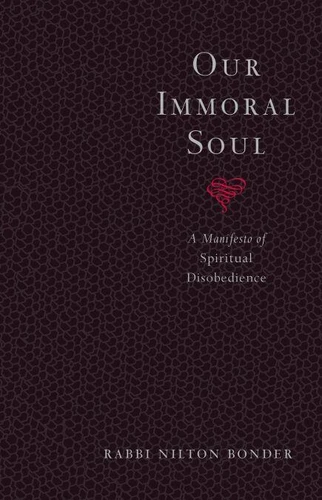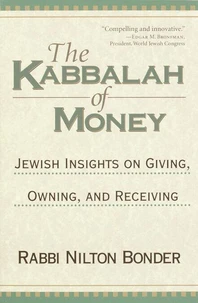Our Immoral Soul. A Manifesto of Spiritual Disobedience
Par :Formats :
Disponible dans votre compte client Decitre ou Furet du Nord dès validation de votre commande. Le format ePub protégé est :
- Compatible avec une lecture sur My Vivlio (smartphone, tablette, ordinateur)
- Compatible avec une lecture sur liseuses Vivlio
- Pour les liseuses autres que Vivlio, vous devez utiliser le logiciel Adobe Digital Edition. Non compatible avec la lecture sur les liseuses Kindle, Remarkable et Sony
- Non compatible avec un achat hors France métropolitaine
 , qui est-ce ?
, qui est-ce ?Notre partenaire de plateforme de lecture numérique où vous retrouverez l'ensemble de vos ebooks gratuitement
Pour en savoir plus sur nos ebooks, consultez notre aide en ligne ici
- Nombre de pages128
- FormatePub
- ISBN978-0-8348-2972-5
- EAN9780834829725
- Date de parution11/02/2014
- Protection num.Adobe DRM
- Taille307 Ko
- Infos supplémentairesepub
- ÉditeurShambhala
Résumé
Rabbi Bonder turns a few conventional ideas on their heads as he identifies the forces at play in individual, social, and spiritual transformation. Many people believe that obedience to the established moral order leads to the well-being of society as well as the salvation of their souls. On the contrary, says Bonder, the human spirit is nourished by the impulse to betray and transgress the ways of the past.
Even the Bible legitimizes our God-given urge to disobey in order to evolve, grow, and transcend. It is this "immoral" soul of ours that impels us to do battle with God-and out of this clash, Bonder predicts, a new humanity will emerge. In the course of discussion, he examines a variety of intriguing issues touching on religion, science, and culture, including the findings of evolutionary psychology; the relation of body and soul; infidelity in marriage; the stereotype of Jew as traitor; sacrifice and redemption in Judaism and Christianity; and the Messiah as archetypal transgressor.
Even the Bible legitimizes our God-given urge to disobey in order to evolve, grow, and transcend. It is this "immoral" soul of ours that impels us to do battle with God-and out of this clash, Bonder predicts, a new humanity will emerge. In the course of discussion, he examines a variety of intriguing issues touching on religion, science, and culture, including the findings of evolutionary psychology; the relation of body and soul; infidelity in marriage; the stereotype of Jew as traitor; sacrifice and redemption in Judaism and Christianity; and the Messiah as archetypal transgressor.
Rabbi Bonder turns a few conventional ideas on their heads as he identifies the forces at play in individual, social, and spiritual transformation. Many people believe that obedience to the established moral order leads to the well-being of society as well as the salvation of their souls. On the contrary, says Bonder, the human spirit is nourished by the impulse to betray and transgress the ways of the past.
Even the Bible legitimizes our God-given urge to disobey in order to evolve, grow, and transcend. It is this "immoral" soul of ours that impels us to do battle with God-and out of this clash, Bonder predicts, a new humanity will emerge. In the course of discussion, he examines a variety of intriguing issues touching on religion, science, and culture, including the findings of evolutionary psychology; the relation of body and soul; infidelity in marriage; the stereotype of Jew as traitor; sacrifice and redemption in Judaism and Christianity; and the Messiah as archetypal transgressor.
Even the Bible legitimizes our God-given urge to disobey in order to evolve, grow, and transcend. It is this "immoral" soul of ours that impels us to do battle with God-and out of this clash, Bonder predicts, a new humanity will emerge. In the course of discussion, he examines a variety of intriguing issues touching on religion, science, and culture, including the findings of evolutionary psychology; the relation of body and soul; infidelity in marriage; the stereotype of Jew as traitor; sacrifice and redemption in Judaism and Christianity; and the Messiah as archetypal transgressor.





